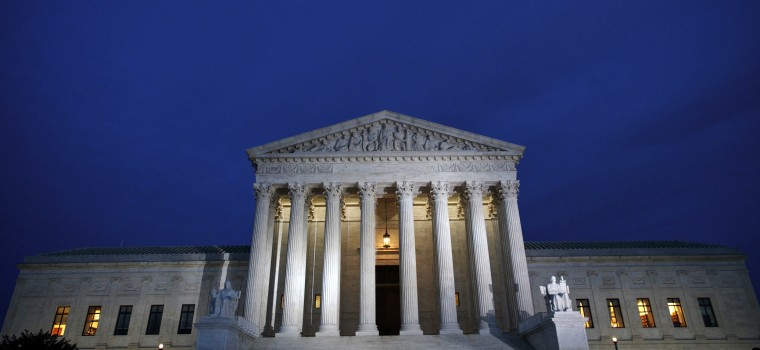The Supreme Court on Tuesday will take up what is likely to be the most important case of the term, a make-or-break challenge to the Affordable Care Act, better known as Obamacare.
With a solid 6-3 conservative majority, the court will decide the future of President Barack Obama's signature legislation, a law Republicans have long opposed but one that 20 million Americans now depend on for their health insurance.
The law's challengers, 18 red states led by Texas, are urging the court to rule that Obamacare's requirement for nearly all Americans to obtain health insurance or pay income tax penalties — known as the individual mandate — is unconstitutional. And they say the entire law must be scrapped.
The Supreme Court first upheld the law in 2012. The majority opinion written by Chief Justice John Roberts said the individual mandate was a legitimate exercise of Congress' taxing authority. But in 2017, the Republican-led Congress set the tax penalty at zero.
That led the red states to argue that because the tax was effectively eliminated, the revised law could not be saved as a tax and was therefore an unconstitutional effort to require all Americans to obtain something, specifically insurance. A federal judge in Texas agreed, and the 5th U.S. Circuit Court of Appeals in New Orleans upheld the ruling.
"The provision's saving construction is no longer available," the appeals court said. Without the tax, it concluded, Congress has no authority to require Americans to buy health insurance. "It is an individual mandate, not an individual suggestion."
But 20 blue states, led by California, asked the Supreme Court to overturn the lower court decisions, arguing that with the tax penalty at zero, there effectively is no individual mandate, so the law is not unconstitutional.
"It may encourage Americans to buy insurance, but it does not require anyone to do anything," they said in their written brief. "Individuals still have a choice: buy insurance or don't."
The Supreme Court's newest member, Justice Amy Coney Barrett, might be inclined to agree with the red states about the constitutionality of the mandate. In a 2017 law review article, she said Roberts' opinion "pushed the Affordable Care Act beyond its plausible meaning to save the statute."
But even if the court rules that the individual mandate is unconstitutional, the justices must still decide whether that dooms the entire law or whether the rest of it can be left intact.
The red states say Congress meant the health care law to work as an integrated whole. Prohibiting insurers from denying coverage for pre-existing conditions and allowing young people to stay longer on the policies of their parents are meant to work because of the near-universal command to buy insurance. Without the mandate, the challengers say, the law falls apart.
But the blue states say the test for deciding whether the rest of a law can be saved if part of it is struck down is a simple one: What did Congress want? The answer, they say, is found in the 2017 action that set the tax at zero. Congress left the rest of the law intact.
It is not at all clear how Barrett would answer that question, and it is possible that the court might rule that even if the mandate is unconstitutional, the rest of the law can be allowed to stand.
Roman Martinez, a Washington, D.C., appeals lawyer, said the blue states might have the better argument.
"It seems fairly clear from the history that Congress wanted a toothless mandate coupled with the remaining provisions of the Affordable Care Act remaining in place," he said.
Some of the court's conservatives have signaled that without a clear expression of congressional intent, they are unwilling to strike down an entire law if part of it is invalid. In a ruling last term, Justice Brett Kavanaugh, joined by Roberts and Justice Samuel Alito, said the court must presume that a law can survive.
"The Court's remedial preference after finding a provision of a federal law unconstitutional has been to salvage rather than destroy the rest of the law passed by Congress and signed by the President," he wrote. "Constitutional litigation is not a game of gotcha against Congress, where litigants can ride a discrete constitutional flaw in a statute to take down the whole, otherwise constitutional statute."
The nation's coronavirus crisis might also be a factor, said Nicole Saharsky, a Washington, D.C., lawyer and former assistant to the solicitor general in the Justice Department. "We're in the middle of a pandemic, and we have a statute that seems to have been working for years," she said.
The court will hear oral argument by telephone conference call and issue a decision by next spring.

